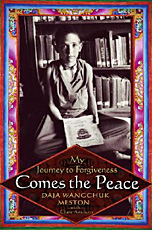Daja Wangchuk Meston's life has been a spiritual adventure par excellence. In the 1960s his hippie parents left America in search of enlightenment. He was born in Switzerland and then sent to live for three years with a Tibetan family in Nepal. His father suffered a breakdown and disappeared in the Himalayan Mountains. His mother, Feather, decided to become a Buddhist nun and enrolled him in a Tibetan monastery when he was six years old.
Daja always felt like an outsider in this milieu, so when he was 16 he left for America and a new life. In California, he connected with some of his relatives before moving to Boston where he met Phuntsok Dolma, a 19-year-old Tibetan woman. They married and moved into a Tibetan settlement house. Daja enrolled in Brandeis University and graduated summa cum laude in sociology in 1996. He then became active in the Tibetan-rights movement and served as an interpreter for journalists and congressmen traveling there to determine what was happening. In August of 1999, Daja went to China on his own and after photographing a prison labor camp was taken into custody and interrogated by Chinese officials.
Daja Wangchuk Meston has written his memoir with Clare Ansberry, the Pittsburgh bureau chief for the Wall Street Journal and author of The Woman of Troy Hill. His journey of forgiveness unspools on two major fronts: his attempt to reconnect with his mother and father and his response to the violent and oppressive Chinese who killed many Tibetans and tortured him. But even more than that, this memoir is about the connections that give life meaning — those to family, community, and place.
